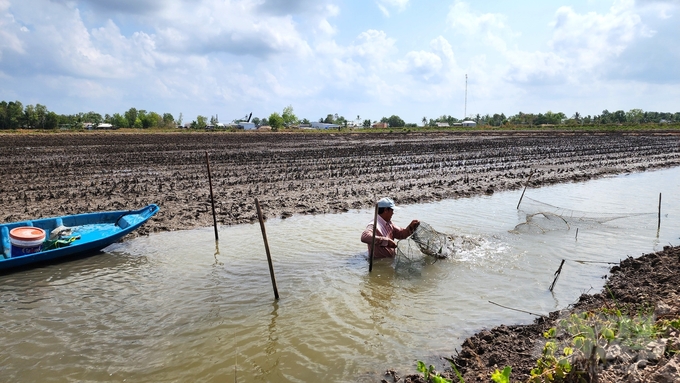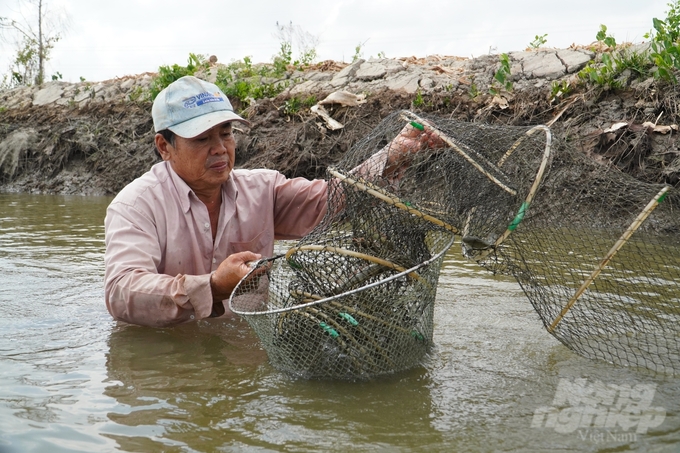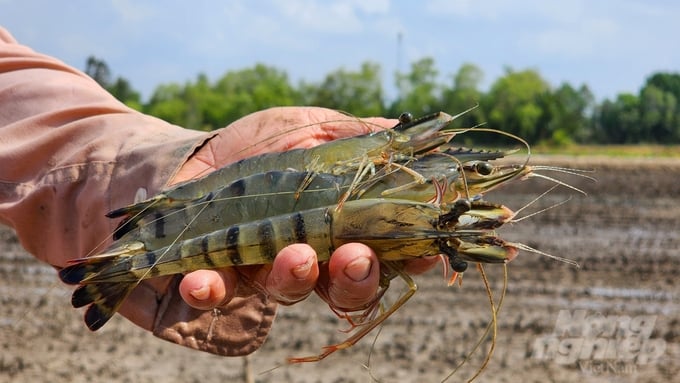June 2, 2025 | 17:31 GMT +7
June 2, 2025 | 17:31 GMT +7
Hotline: 0913.378.918
June 2, 2025 | 17:31 GMT +7
Hotline: 0913.378.918

Rice-shrimp farming field in Tran Van Thoi district, Ca Mau province, at the time of harvesting black tiger shrimp. Photo: Kim Anh.
Rice-shrimp farming is considered a unique and favorable agricultural model associated with some coastal localities in the Mekong Delta, such as Kien Giang, Soc Trang, Bac Lieu, Ca Mau...
The model's characteristic alternates between saltwater and freshwater seasons, creating suitable ecological conditions for rice and shrimp to grow together. Farmed shrimp have natural food sources, do not get sick, and do not need medication. On the other hand, rice plants also have conditions to grow without using pesticides and fertilizers.
At the end of this season, salt water has flooded the fields of Tran Van Thoi district, Ca Mau province. This is also when farmers let the land rest, basking in the sun and wind to wait for the new rice season. People retain part of the saltwater in the fields to start shrimp farming.
This place used to be an area specializing in growing 2 rice crops a year, so farmers' profits were relatively low. Since 2000, the Ca Mau provincial government has implemented a policy of converting production to a model of shrimp farming - natural rice, adapting to climate change.

Shrimp are raised entirely in natural conditions, with a rich, nutritious food source from aquatic species created by rice plants. Photo: Kim Anh.
Farmers start sowing rice in August, and after harvesting in November, they will improve the soil, dry the lagoon and use lime to treat water. When the right time comes, start raising black tiger shrimp in rice fields. In addition, farmers boldly experimented with and applied microbial products to improve ponds, increasing the model's efficiency many times.
The sun was already rising. Mr. Nhan Van Dung in Giao Vam hamlet, Loi An commune, just started pushing the boat, wading into the shrimp pond to remove the traps placed the night before. With many years of experience, he knows which location will yield a lot of shrimp, so in less than 1 hour, more than 50kg of shrimp were collected in buckets, transported to the house for classification, waiting for traders to come and buy.
The price of black tiger shrimp is also higher than before, ranging from VND 140,000 - VND 310,000/kg (depending on size). According to Mr. Dung, it is normal for farmers to collect 50 - 80 kilograms of shrimp daily during harvest season. Thanks to that, he pocketed millions every day.

Farmer Nhan Van Dung is a growing and successful household with rice-shrimp farming in Tran Van Thoi district. Photo: Kim Anh.
Besides being one of the farmers developing quite successfully with the shrimp-rice model. Mr. Dung is also a pioneer in applying microbial products to replace lime to improve 1 hectare of family land.
According to Mr. Dung, with the specific characteristics of shrimp-rice farming, people in Giao Vam hamlet are very "afraid" of using chemical fertilizers and drugs in rice fields. Microbial products help decompose straw quickly, producing rice snails and pheasants. With an average of over 3 months of farming, Mr. Dung's shrimp farm can harvest shrimp at a size of 40 shrimps/kilogram. Currently, this time has been shortened to 2 - 2.5 months for shrimp to reach size 20 shrimps/kilogram.
The winter-spring crop of 2023 - 2024 has just been harvested, and the yield has also reached 6 tons/ha. He alternately releases 3 batches of shrimp, with an average number of shrimp seeds ranging from 24,000 to 30,000 shrimps/ batch.
According to statistics, Giao Vam hamlet has about 376 hectares of rice-shrimp farming model. Mr. Nguyen Vu Lam is cultivating about 2.5 hectares of rice-shrimp farming in Giao Vam hamlet and confided that to stick with and develop sustainably with this model, people are very proactive in applying environmentally friendly products, a closed production chain.

Farmers apply microbial products to improve ponds and limit diseases in shrimp during farming. Photo: Kim Anh.
Mr. Le Van Quang, Chairman of Minh Phu Seafood Group, said that the business has been cooperating with farmers to deploy and develop a shrimp-rice model that is certified by ASC/BAP/organic and biodynamic.
If this plan is implemented successfully, this model will be environmentally sustainable and ensure economic sustainability for people with an income of hundreds of millions, even billions per year per hectare.
"Many households joined together to form cooperative groups, many cooperative groups joined together to form new-style cooperatives. At that time, money was needed to invest in infrastructure such as water supply canals, drainage canals, and roads to mechanize the seeding and harvesting, reduce costs, and increase productivity and output by 2-10 times", Mr. Quang offered solutions to increase profits from rice-shrimp farming.

The rice-shrimp model average yields 5 - 8 tons of rice/ha and 300 - 1,000kg of shrimp. Photo: Kim Anh.
According to statistics, the entire Mekong Delta currently has about 200,000 hectares of rice-shrimp farming model and has the potential to grow to 1 million hectares. For farmers to achieve profits of VND 1 - 2.5 billion/ha/year, in addition to the issue of cooperation and cooperation to create large rice shrimp fields, infrastructure investment capital is also essential.
Mr. Quang believes that in the future, the rice-shrimp farming model will develop vigorously and quickly become the primary agricultural production model of the Mekong Delta region.
Translated by Tuan Huy

(VAN) TTC AgriS and IFC signed a strategic partnership to develop a sustainable agricultural value chain, aiming to achieve the Net Zero target by 2035.

(VAN) Seafood by-products are opening a new path, combining green growth and technological innovation to enhance the industry's value.

(VAN) Mr. Nguyen Thanh Cong, Vice Chairman of the Son La Provincial People's Committee, reflects on Son La’s journey from barren hills to fruitful orchards after a decade of hard work.

(VAN) FAO’s Director-General addresses the 5th Baghdad International Water Conference.
/2025/05/26/1716-4-nongnghiep-191706.jpg)
(VAN) Chain linkages, technological innovation, and raw material zoning are three strategic pillars for the coconut industry to strongly develop and elevate its position on the global agricultural map.
![Advanced mariculture – an inevitable trend: [4] Accompanied by scientists](https://t.ex-cdn.com/nongnghiepmoitruong.vn/608w/files/sohk/2025/05/13/1941-pgsts-vo-van-nha-140958_717.jpg)
(VAN) According to Assoc. Prof. Dr. Vo Van Nha, Director of the RIA III, the development of advanced offshore mariculture is no longer an option but an essential path for Vietnam’s fisheries sector.

(VAN) Vietnam is intensifying the development of mollusk farming areas that meet international standards, aiming for sustainable growth and enhancing its export position in the global seafood market.